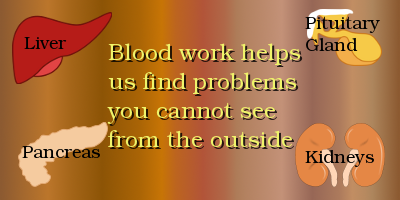

Serum Chemistry Panel
(pdf brochure diagnostic testing) courtesy of IDEXX.
The following are some parameters we can measure: (Why run this test ?)
Albumin – is a small protein produced by the liver. Albumin acts as a sponge to hold water in the blood vessels. When blood albumin is decreased, the pressure created by the heart forcing blood through the blood vessels causes the fluid to leak out of the blood vessels and accumulate in body cavities such as the abdominal cavity or in tissues as edema. Albumin is decreased if the liver is damaged and cannot produce an adequate amount of albumin or if albumin is lost through damaged intestine or in the urine due to kidney disease. The only cause of increased albumin is dehydration.
ALT (alanine aminotransferase) ALT is an enzyme produced by liver cells. Liver damage causes ALT to increase in the bloodstream. Elevations in ALT may be caused from acute liver disease, poisoning hepatitis, pancreatitis, or from the use of Phenobarbital or cortisone-type drugs.
ALP (Alkaline Phosphatase) ALP is found in a variety of tissues including the intestine, liver, bone and kidneys. Elevations are very common for dogs taking Phenobarbital and do not necessarily indicate liver disease in these cases.
Amylase is an enzyme produced by the pancreas and the intestines. Amylase helps the body breakdown sugars. Amylase may be increased in the blood in dogs with inflammation or cancer of the pancreas, renal failure or from the use of corticosteroids.
AST (Aspartate aminotransferase) AST occurs in the liver and all types of muscle. Elevations in AST may indicate liver disease, muscular diseases or heart disease.
Bilirubin is produced by the liver from old red blood cells. Bilirubin is increased in the blood in dogs with some types of liver disease, gallbladder disease or in dogs who are destroying red blood cells faster than the normal rate.
BUN (blood urea nitrogen) is influenced by the liver, kidneys and by dehydration. BUN is a waste product produced by the liver from proteins and is eliminated from the body by the kidneys. A low BUN may be seen with liver disease and an increased BUN indicates kidney disease.
Calcium in the bloodstream originates from the bones and levels are influenced by diet, hormone levels and blood protein levels. Abnormally high calcium in the blood is seen in dogs with hypercalcaemia, hypoadrenocorticism, primary renal failure or overdoses of vitamin D. Low calcium levels may indicate hypocalcaemia, hypoalbuminaemia, malabsorption, or acute pancreatitis. Muscle twitches may occur in dogs with decreased levels.
Cholesterol is a form of fat. Some of the more common causes of elevated cholesterol are hypothyroidism, Cushings disease, diabetes, acute pancreatitis and kidney diseases. High cholesterol does not predispose dogs to heart disease as it does in people.
Creatinine is a waste product that originates from muscles and is eliminated from the body by the kidneys. An elevation of creatinine is due to kidney disease, seizures or dehydration.
GGT (Gamma-glutamyltransferase) Circulating GGT is considered to originate from the liver. Elevations are caused from the use of glucocorticoid therapy or liver disease.
Globulins (Glob) are decreased with problems with antibodies, immunodeficiency viruses or risk of infectious disease. Increased levels may indicate stress, dehydration, blood cancer, allergies, liver disease, heart disease, arthritis or diabetes.
Glucose is only accurate if a proper fast has preceded the blood draw. The most common cause of elevations in glucose levels is improper fasting. If glucose levels are high with a proper fast it would indicate diabetes mellitus, steroid therapy, acute pancreatitis or hyperadrenocorticism. Low glucose levels indicate hypoglycemia, liver insufficiency or insulin overdose.
Lipase elevations indicate pancreatitis.
Phosphorus is affected by diet, parathyroid hormone and kidney. Decreased levels shows overactive parathyroid gland and malignancies, malnutrition and malabsorption. Increases are seen with under active parathyroid gland and kidney failure.
Total Protein includes albumin and globulins. Total protein can be increased from infection, inflammation, dehydration or when the dog’s immune system is being stimulated to produce large amounts of antibodies. It is decreased from liver insufficiency, or when the dog has an abnormal immune system and can’t produce antibodies.
Triglycerides are another form of fat and are responsible for gross lipemia often seen in serum or plasma samples. Elevations are caused by insufficient fasting prior to blood sample, hypothyroidism and diabetes mellitus.
![]()

